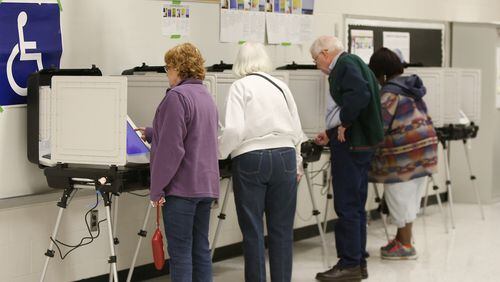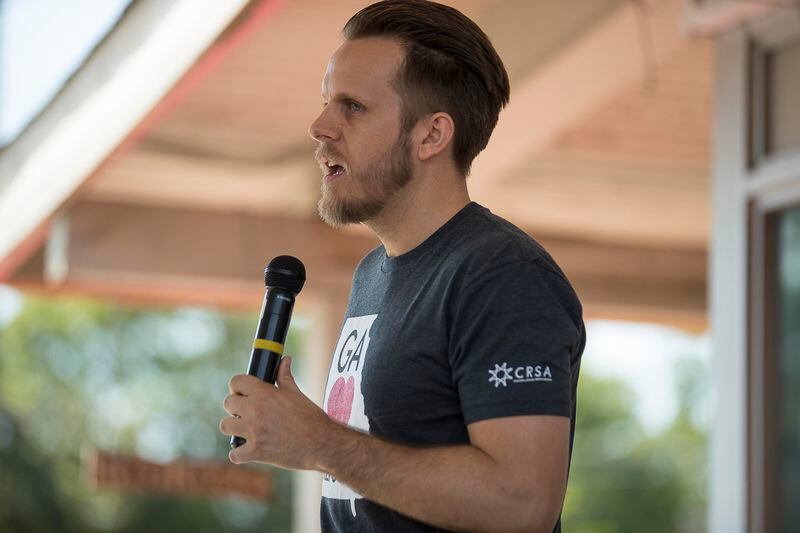No doubt there is such a thing as ideological drift in politics, especially in primaries. Candidates often become unmoored and move right or left in a search for their party's most ardent activists.
But sometimes this drift isn’t ideological. It’s generational.
Last week, Teresa Tomlinson rolled out a package of policies she would pursue if she succeeds in her quest to replace U.S. Sen. David Perdue next year. One of them was something of a surprise.
“It is time we address at the federal level the decriminalization, legalization, and regulation of marijuana as a medicinal and recreational substance,” the Democrat posted on her website.
The former mayor of Columbus called for the removal of cannabis from the federal list of controlled substances that equates pot with heroin. Tomlinson wants changes to the Internal Revenue Code and banking regulations to bring a taxed, regulated marijuana industry into the mainstream of the American economy.
Tomlinson said Georgia, which has embraced the idea of medicinal pot, wouldn’t have recreational marijuana forced down its throat. Think of alcohol in a post-Prohibition world. “The states can adjust how they want to regulate that system. But it’s not going to be criminalized at the federal level. There’s definitely a states' rights component to it,” she said.
In an interview, Tomlinson said she had been mulling the issue since Colorado legalized recreational marijuana five years ago, revealing the tangle of legal contradictions that arise when a state allows something that the federal government forbids.
Some Republicans have already endorsed the idea. Last Tuesday, a U.S. Senate committee with a GOP chairman took up the complaints of cannabis companies who say they’re forced to deal in cash because federal regulations have frightened banks away.
Nonetheless, many other Republicans are pointing to the fact that Clarkston Mayor Ted Terry recently entered the Democratic race for the U.S. Senate. In 2016, Clarkston became the first city in Georgia to make the penalty for possession of small amounts of marijuana something akin to a parking ticket.
Terry has been described as charismatic, media-savvy and rather far to the left on the political spectrum. Tomlinson’s marijuana initiative, GOP strategists immediately said, is proof of his gravitational pull. Which will benefit Perdue in November 2020.
Credit: Alyssa Pointer
Credit: Alyssa Pointer
Nonsense, says I. This is evidence, once again, that one of the most powerful forces in politics is the Grim Reaper. God is simply not making as many 70-year-old white people as He used to. And I say that as a card-carrying member of the Get Off My Lawn Club.
But I’m not so old that no whippersnapper can impress me. Chris Huttman is a number-cruncher. Maybe the best that Georgia Democrats have. He’s not attached to any U.S. Senate candidate but does work for U.S. Rep. Lucy McBath, state Sen. Jen Jordan, and state Rep. Michael Wilensky.
Huttman has invented a crude time machine — a way of estimating when Democrats might make their long-awaited comeback. Sociologists might more politely refer to it as a generational succession model.
Huttman simply totaled up the 1,162,530 people who picked up Republican or Democratic ballots in the 2018 May primary and culled them by age.
Fifty-two percent of primary voters picked up GOP ballots. But Democrats cast the majority of ballots until voters 73-years-old and up were added into Huttman's model. Those voters will be 75 and up in 2020. Actuarial charts say they’ll be fewer in number.
Fifty-eight percent of voters under the age of 50 picked up Democratic ballots in last year’s primaries. “Essentially, the ‘over 50’ voter is the old Georgia of the 2000s,” Huttman wrote me in an email. “Only 43% chose Democratic ballots, similar to the average vote we received in presidential and governor’s races through the 2010s.”
The connection between age, race and political orientation can’t be denied, especially in these exciting times. A Georgia survey conducted last week by Public Policy Polling of North Carolina showed President Donald Trump losing his re-election bid to a generic age group among all voters — except those 65 and older.
But using last year’s primary figures, Huttman can even sort 2018 primary voters by congressional district to see what areas of the state might be within reach for Democrats and which are likely to stay Republican.
In congressional districts held by Democrats Sanford Bishop of Albany (Second), Hank Johnson of Decatur (Fourth), John Lewis of Atlanta (Fifth) and David Scott of Atlanta (13th), even elderly voters are picking up Democratic ballots.
In congressional districts held by Republicans Drew Ferguson of West Point (Third), Austin Scott of Tifton (Eighth), Doug Collins of Gainesville (Ninth), Rick Allen of Augusta (12th) and Tom Graves of Ranger (14th), even a majority of the youngest voters picked up GOP ballots.
In the Sixth District lost by Republican Karen Handel last year, 67% of voters under 50 selected Democratic ballots in last year’s primary. GOP voters did cast a majority of ballots, but only after voters 79 years old and older were counted. Needless to say, those voters will be 81 and up next year — meaning that unseating Democrat Lucy McBath could be harder than many Republicans think.
On the other hand, flipping the Seventh District, being abandoned by U.S. Rep. Rob Woodall, R-Lawrenceville, might be a steeper climb than Democrats assume, according to Huttman’s age-based formula. Democratic ballots were in the minority once those cast by voters age 60 and up were counted.
In other words, the GOP base in the Seventh may be more resilient than Democrats assume.
Huttman’s model has some limitations. Last year’s primary turnout of 1.16 million was dwarfed by a November general election that generated nearly 4 million ballots. So independents and more casual voters aren’t part of his calculations.
But the advantage of Huttman’s time machine is that this is no randomized survey with a fluctuating margin of error. It is built on real people and real ballots — and on a certain inevitability that all of us understand.
Our acceptance or rejection of Trump, gay marriage, this political party or that, and even marijuana are often driven by when we came of age. Tomlinson’s cannabis initiative is a convenient intersection of policy and shifting demographics, though she prefers to give more weight to the former than the latter.
“I appreciate it if it does rev up the millennial vote. That’s great," she told me. "But that’s not why we did it.”
About the Author










